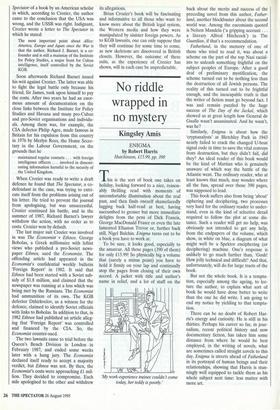No riddle wrapped in no mystery
Kingsley Amis
ENIGMA by Robert Harris Hutchinson, £15.99, pp. 390 This is the sort of book one takes on holiday, looking forward to a nice, reason- ably thrilling read with moments of uncomfortable illumination about the real past, and then finds oneself shamefacedly lugging back half-read at best, having succumbed to grosser but more immediate delights from the pens of Dick Francis, George MacDonald Fraser or even the late lamented Ellaston Trevor or, further back still, Nigel Balchin. Enigma turns out to be a book you have to work at.
To be sure, it looks good, especially to the amateur. All those pages (390 of them) for only £15.99! So physically big a volume that (surely a minus point) you have to hold it firmly on your lap and continually stop the pages from closing of their own accord. A jacket with title and author's name in relief, and a lot of stuff on the 'My work-experience trainee couldn't come today, her teddy is poorly.' back about the merits and success of the preceding novel from this author, Father- land, another blockbuster about the second world war. Among the encomiasts quoted is Nelson Mandela Ca gripping account . . . a literary Alfred Hitchcock') in The Guardian, if that's a recommendation.
Fatherland, in the memory of one of those who tried to read it, was about a scheme on the part of the top Nazi racial- ists to unleash something frightful on the subject peoples of Europe. After a good deal of preliminary mystification, the scheme turned out to be nothing less than the destruction of all Jewish persons. The reality of this turned out to be frightful enough, and the inescapable truth is that the writer of fiction must go beyond fact. I was and remain puzzled by the huge success of The Day of the Jackal, which showed us at great length how General de Gaulle wasn't assassinated. And he wasn't, was he?
Similarly, Enigma is about how the `cryptanalysts' at Bletchley Park in 1943 nearly failed to crack the changed U-boat signal code in time to save the vital convoys from destruction, but they didn't fail, did they? An ideal reader of this book would be the kind of Martian who is genuinely unaware of which way the battle of the Atlantic went. The ordinary reader, who at least knows that much, may wonder where all the fuss, spread over those 390 pages, was supposed to lead.
This book suffers also from being 'about' ciphering and deciphering, two processes very hard for the ordinary reader to under- stand, even in the kind of selective detail required to follow the plot at some dis- tance. Such a reader will get no help, was obviously not intended to get any help, from the endpapers of the volume, which show, in white on blue, a diagram of what might well be a Spelctor enciphering (or deciphering) machine. One's response is unlikely to go much further than, 'Gosh! How jolly technical and difficult!' And that, unfortunately, will do for large tracts of the book.
But not the whole book. It is a tempta- tion, especially among the ageing, to lec- ture the author, to explain what sort of book he would have done better to write than the one he did write. I am going to end my notice by yielding to that tempta- tion.
There can be no doubt of Robert Har- ris's energy and curiosity. He is still in his thirties. Perhaps his career so far, in jour- nalism, recent political history and now documentary fiction, has taken him some distance from where he would be best employed, in the writing of novels, what are sometimes called straight novels to this day. Enigma is streets ahead of Fatherland in its portrayal of human beings and their relationships, showing that Harris is stun- ningly well equipped to tackle them as his whole subject next time: less matter with more art.


















































 Previous page
Previous page